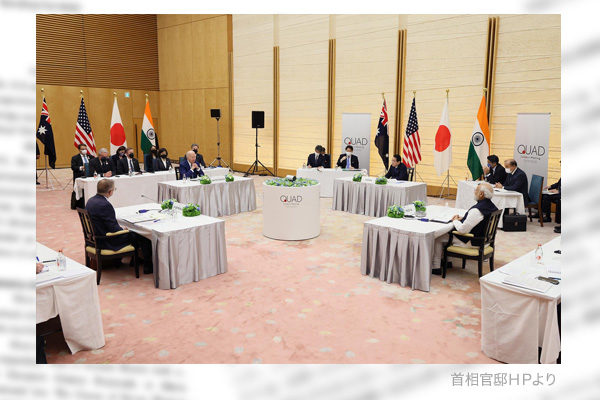The U.S. Biden administration’s strategic goal is to prevent the 21st century from becoming an age of autocratic domination. Russia’s war of aggression against Ukraine has prompted the semi-divided North Atlantic Treaty Organization to enhance its unity and encouraged the Japan-U.S.-Australia-India quadrilateral security dialogue, or the Quad, to make a big step forward to deter China in the Indo-Pacific region. In the future, the Quad should deepen its cooperation with like-minded countries in Europe and Asia to contain the China-Russia axis.
Japan struggled to involve India
China’s miliary blackmail against Taiwan coincided with Russian troops’ amassing on the Ukraine border from early this year. The Ukraine war prevents the United States from focusing on its great power competition with China. If the U.S. is distracted by events on the European front, U.S. power for defending Taiwan at the forefront of Asia may weaken.
Furthermore, a discord was erupting within the Quad that is to deter China’s attack on Taiwan. While Japan, the U.S. and Australia impose economic sanctions on Russia, India that depends on Russian weapons refrains from denouncing Russia. Japan struggled to coordinate between the four countries toward the Quad summit that Japan hosted in Tokyo on May 24. A Quad joint leaders’ statement issued after the summit, while failing to criticize Russia by name, indicated that India came closer than ever to the Japan-U.S.-Australia side.
The statement explicitly took up the Ukraine war by citing “a tragic conflict raging in Ukraine” and said: “We strongly support… peaceful settlement of disputes without resorting to threat or use of force, any unilateral attempt to change the status quo…”
Regarding Indo-Pacific security, a new framework of AUKUS, comprising Australia, the United Kingdom and the United States, is a “hard” alliance focusing on military collaborations, while the Quad has been considered a “soft” alliance that seeks mostly non-military cooperation to counter China. Giving considerations to India, the U.S. has carefully kept the Quad’s military color weak but gradually changed the tone of the group.
In particular, the Quad leaders this time agreed to launch the Indo-Pacific Partnership for Maritime Domain Awareness (IPMDA) to respond to humanitarian and natural disasters and combat mainly Chinese fishing boats’ illegal operations, indicating the Quad came closer to security cooperation. As the military forces of each country have been involved in MDA operations, the new partnership may have many points in common with intelligence gathering, maritime transportation and other operations by the military.
Seeking further cooperation with European and Asian countries
At a time when a relative decline is seen in the U.S. global position, the Quad will have to cooperate with like-minded countries in Europe and Asia to maintain the balance of power with China. In such case, however, U.S. President Joe Biden’s reiterated rhetoric of “democracy versus autocracy” could impede the cooperation.
To contain China and Russia, the Quad should give priority to geopolitics rather than ideology and cooperate with non-democratic countries such as Singapore, Turkey and Vietnam. To achieve energy security, the Quad should also coordinate with Saudi Arabia and other Gulf oil-producing dictatorial monarchies. The Quad has to be firmly fixed and function as a promoter of the free and open Indo-Pacific.
Hiroshi Yuasa is a Planning Committee member and a senior fellow at the Japan Institute for National Fundamentals. He is also a columnist for the Sankei Shimbun newspaper.


